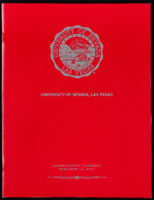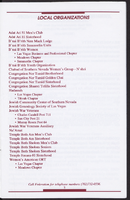Search the Special Collections and Archives Portal
Search Results

Transcript of interview with Richard Steele and Zakeisha Steele-Jones by Claytee White, February 12, 2015
Date
Archival Collection
Description
Richard Steele became interested in professional boxing at a young age when he was introduced to world champion boxers Chalky Wright and Sugar Ray Robinson. He trained at Hoover Street Gym in South Central, Los Angeles, with trainer Eddie Futch. Richard joined and boxed for the United States Marine Corps and became Marine Corps Middleweight Champion in 1963. Born in Kansas City, Missouri in 1944 Richard and his family moved to Los Angeles, California in the early 1950s. His father was a bartender and his mother was an elevator operator. During the interview Richard’s daughter Zakeisha Steele-Jones discusses the various job titles her father has held, including professional actor and campus police officer. Most notably, Richard was the second Black professional referee in both Los Angeles, California, and Las Vegas, Nevada. A profound interview heralding key character traits, such as, perseverance, resilience, strength, and determination, Richard recalls being personally invited by Nelson Mandela to referee the WBC Convention in South Africa. Some of Richard’s most memorable title fights to date include, the Hearns and Hagler fight, Sugar Ray Leonard and Tommy Hearns, and four Mike Tyson fights. Zakeisha also interjects that her father currently manages and owns a boxing gym where he trains and mentors young Black and Hispanic aspiring boxing champions and referees.
Text

University of Nevada, Las Vegas (UNLV) Fall 2021 commencement program
Date
Archival Collection
Description
Commencement program from University of Nevada, Las Vegas Commencement Programs and Graduation Lists (UA-00115).
Text

Alber A. Mora oral history interview: transcript
Date
Archival Collection
Description
Oral history interview with Alber A. Mora conducted by Rodrigo Vazquez and Laurents Bañuelos-Benitez on December 7, 2018 for the Latinx Voices of Southern Nevada Oral History Project. Alber Mora talks about his life growing up in Cuba with his family and the circumstances of their departure from the country; his brother faced pressures to join the military, which led the Mora family to immigrate to the United States by way of a fishing boat in 1994. Alber discusses the family's lives in Houston, Texas and how he met and married his wife, Rosemary, before the couple moved to Los Angeles and Alber began working at Porto's Bakery, a famous Cuban eatery in L.A. Alber shares how he and his wife eventually moved to Las Vegas, where he works for Caesar's Palace and for the Culinary Workers Union as a Shop Steward.
Text

University of Nevada, Las Vegas (UNLV) Spring 2016 commencement program
Date
Archival Collection
Description
Commencement program from University of Nevada, Las Vegas Commencement Programs and Graduation Lists (UA-00115).
Text

Anthony Kappenman oral history interview: transcript
Date
Archival Collection
Description
Oral history interview with Anthony Kappenman conducted by Claytee D. White on May 16, 2019 for the Remembering 1 October Oral History Project. Kappenman begins the interview by talking about his early life, childhood, work, and his time in the military. Afterwards, he recalls what he did on October 1, 2017 prior to the Route 91 festival and during the shooting. He describes his journey trying to escape the area, arriving at the airport injured, and his stay in the hospital. Then, Kappenman talks about how he felt about the way the city and first responders had responded during the shooting, and how the community united afterwards. Lastly, he talks about his opinions on gun control, his recovery, and how he felt after the shooting.
Text

Kaity Webber oral history interview: transcript
Date
Archival Collection
Description
Oral history interview with Kaity Webber conducted by Barbara Tabach on November 16, 2017 for the Remembering 1 October Oral History Project. Kaity Webber describes moving to Las Vegas, Nevada and earning her degree in psychology from the University of Nevada, Las Vegas. Webber discusses the excitement she had going to the Route 91 Harvest festival with a friend on the weekend of the October 1, 2017 Las Vegas shooting. She talks about her experiences from that night, including how she found shelter in the Thomas & Mack Center with countless others, as well as her process of healing from the traumatic event.
Text

Transcript of interview with Harvey N. Dondero by Elizabeth N. Patrick, August 9, 1984
Date
Archival Collection
Description
Text

Transcript of interview with Mike and Sallie Gordon by Adriane Massa, March 2, 1977
Date
Archival Collection
Description
Mike Gordon speaks about their liquor stores and lists his occupation as a bartender. Among the civic organizations that he participated in were: Young Democrats, Eagles Lodge, Lions Club, past president of Temple Beth Sholom and B'nai B'rith Lodge. Together Mike and Sallie recall the growth and changes of the valley they have witnessed between the early 1930s and mid-1970s. Among his anecdotes is one about the carrying of payroll checks to Boulder Dam to avoid "interference" (robberies).
Mike and Sallie were among the very first people of Jewish ancestry to make their way to Las Vegas. They arrived January 26, 1932 to join relatives of Sallie?s who had moved to Las Vegas when the Boulder Dam construction began. They had married in 1930 in Pittsburgh, Pennsylvania. Soon they were involved members of a small but growing group of Jewish pioneers and helped found Temple Beth Sholom, the community?s first synagogue. Mike speaks about their liquor stores and lists his occupation as a bartender. Among the civic organizations that he participated in were: Young Democrats, Eagles Lodge, Lions Club, past president of Temple Beth Sholom and B?nai B?rith Lodge. Together Mike and Sallie recall the growth and changes of the valley they have witnessed between the early 1930s and mid-1970s. Among his anecdotes is one about the carrying of payroll checks to Boulder Dam to avoid ?interference? (robberies).
Text


